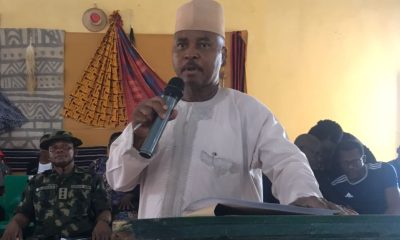Agriculture
Border Re-opening: Implications for Nigerian Rice Producers, Consumers

By Alice Onukwugha
Recently, the Federal Government of Nigeria under the leadership of Bola Ahmed Tinibu, announced that it would reopen neighbouring Seme border.
Seme border was closed during the previous administration of President Muhammadu Buhari, leading to increase in prices of goods and high cost of living.
Since the announcement, analysts and business people, especially rice dealers have reasoned that the decision has both positive and negative implications for rice producers and consumers.
If the decision goes through consumers may have to enjoy lower prices, thus having more food on their tables, but there is the possibility that local producers may have to run at a loss because of high cost of production, according to Business Analyst, Ignatius Chukwu.
Chukwu, who is also the Regional Manager, South/South, South/East, Business Day Newspaper, with experience spanning over thirty years, told this reporter in Port Harcourt that border closure and reopening is a sensitive matter.
He said: “In fact, anything border is a sensitive matter. So when you close your border it has very big implication on Trade and Commerce and International Trade. And when you open your border, it also has very big implication for any country and countries sharing those borders.
“First our reopening of borders will impact on goods that are smuggled into Nigeria. Some goods enter Nigeria properly and officially. Proper dues are paid, regulations are allowed to play out, quality control will take place. But on the other hand, smuggled goods usually benefit alot when the border is open.
“And we think rice is the number one smuggled goods. So in terms of local pricing, it will surely impact local pricing. Naturally it will reduce the cost per bag and it means that traders will have a boost and consumers will buy it cheaper. That is natural.
“So those who will benefit will be consumers and traders. But we know that consumers and traders are not those who create wealth. Where attention will go to will be local farmers.
“Automatically when the imported rice floods the market and the price goes down, the people who produce rice in Nigeria, whose cost of labour is very high, transportation is very high, inputs such as fertilizers and pesticides, those costs remain very high. It means that the price for local rice will remain high while the price for imported rice will go down.
“It automatically means that demand for imported rice will go high and demand for local rice will go down. So local rice farmers will not be smiling over the policy because if they took loan to produce they will be scared if they can pay back.”
The business analyst faulted President Tinibu for taking decisions of national and international implications when he was yet to constitute a cabinet.
“That is why the Federal government would have set up a cabinet and the minister of agriculture would have come up with various indices and scenarios, studies towards our local rice production and capacities and capabilities, volume and quantity and weigh it against importation.
“Unfortunately, most of these sensitive policies are coming out when there is no cabinet. They are decisions of one man or a faceless caucus. Because the only recognised decision making body in any country is the Federal Executive Council where policies are properly debated. But when important policies like subsidy removal, foreign exchange policies, border policies are taken without a properly constituted cabinet, I see it like the thinking of one man and that is why you see some of those policies we are already having difficulties.”
He, however noted that border opening is in line with international practice of open market. “But on the other hand, border closure annoys international agencies such as World Bank, World Trade Organization (WTO), International Monetary Fund (IMF) because the world preaches open border, which means open market. So those who shut down their borders, they usually do it in defiance of global policy and when you do it you won’t leave the border close forever because it’s seen as a hostile action”, he stated.
On his part, a rice dealer at the popular Creek Road Market in Port Harcourt, Kingsley Emeka described the announcement as a welcome development.
He said: “We the rice dealers and sellers welcome the decision because it will make the price of rice to come down. For example, we sell Nigerian rice presently, N42,000 (forty two thousand naira while foreign rice is sold at N45,000 (forty five thousand naira). But I know that if they open the border you will see that it will drag the price of the local rice down.
“When President Goodluck was here, a beg of foreign rice was N8,000 (eight thousand naira) because border was open. But now because of the closure of border it made the price of rice higher”, he said
On whether it will affect local production, Emeka said: “Yes it will affect local production, but right now most people like Nigerian rice because of the taste and there’s no more stones but we will like the foreign rice to be there so that there will be competition.”
He also used the opportunity to call on customs to reduce import duties on food stuff. “It is not also good that customs impose so much duties on food products. Drugs and other items as such are imported into Nigeria too but not so much duties is imposed on them, so why must it be food stuff, especially rice”, he said.
He pointed out that he made more sales when rice was cheaper. “We were making more sales when rice was cheap because it’s not everybody that can afford forty thousand naira to buy a bag of rice. My customer who has burial program budgeted for two bags of rice but she was able to buy only one bag because of the price. But if it were to be when rice was cheap she would have bought the two bags and that means more sales for me”, he added.
Agriculture
Tiv Monarchs Give Herders Ten Days Ultimatum To Vacate Tiv Kingdom

By David Torough, Abuja
The Tiv Area Traditional Council during its emergency meeting held yesterday in the palace of the Tor Tiv in Gboko requested the Governor Hyacinth Alia led administration to create an enabling environment to allow herders’ peaceful exit of farmlands in Tiv Kingdom to facilitate resumption of farming activities.
Consequently, the Council directs political and traditional rulers in each local government area of Tiv Kingdom to peacefully engage the herders to ensure their exit from the local government areas to allow farming resumes.
The Council which was chaired by the Tor Tiv himself, HRM Prof James Ortese Iorzua Ayatse CFR equally appealed to all herders in Tiv Kingdom in Benue State to vacate all Tiv lands before the end of May 2025 to allow farmers return and cultivate their farms in order to avoid the looming hunger in Nigeria.
According to a Communique signed by the Secretary of the Council Mr Shinyi Tyozua which deliberated particularly on the security situation in Tiv Kingdom the Council enumerated the communities worst affected to include those in Kwande, Katsina Ala, Logo, Ukum, Guma, Makurdi, Gwer West Gwer East and Buruku Local Government Areas.
The Council lamented that farming activities in the kingdom have ceased due to the occupation of farmlands by herders for grazing and attacks and killings of farmers who fled stressing that if the situation continues it will ultimately result to hunger in Tiv Kingdom and Nigeria as a whole.
Agriculture
Ondo Govt. Destroys 200kg Seized Cocoa Adulterants

The Ondo State Government, on Thursday, destroyed 200kg adulterants used for adulteration of cocoa beans, seized from a merchant in Ondo West Local Government Area of the state.
Mr Segun Odusanya, Permanent Secretary in the Ministry of Agriculture and Forestry (Forestry and produce sub section), supervised the destruction of the 200kg bags of seized adulterants.
Odusanya explained that the destruction was part of government efforts to ensure that the state maintained quality cocoa production in the country.
“Mr governor, Lucky Aiyedatiwa, has reiterated the commitment to ensure the state remains the highest producing state with good cocoa quality
“Anyone caught engaging in illegal activities will be prosecuted accordingly.
“Moreover, this action was embarked on to warn cocoa merchants, who intend to engage in illegal activities, to rethink before getting into it.
“We are going to seal any store caught in such illegal activities, the products will be burnt while the merchant will be prosecuted according to the laws of the land.
“If we are saying we are the highest cocoa producing state and we continue to encounter this scenario, it will give us a bad publicity.
“The bad publicity will be in the country and extend to the international market, and we don’t want that,” he said.
The permanent secretary, therefore, commended Aiyedatiwa for graciously approving the recruitment of 60 new staff to checkmate the activities of cocoa merchants in the state.
“Mr governor has supported us, he has said we should recruit more people to guide against any adulteration and ensure we have a good quality cocoa beans.
“I must commended our task force committee for ensuring that the state holds its position in the country and the international market,” he said.
Earlier, Mr Tunji Akinnadeju, a Director of Produce (DP3) in the Grading and Allied Department of the ministry, said the adulterants were intercepted at Ondo West Local Government Area of the state.
Akinnadeju said that the owner of the adulterants took to his heels at the time of arrest.
“As we all know that cocoa is being sold in weight and after adding all these things, it will be sold at high prices, which is not good enough.
“So, doing that will bring a lot of damage to the image of the state and the country at large in the international market,” he said.
Also, Mr Sunday Adegbola, a Director of Produce Licensing in the ministry, said the merchants’ actions could affect people during consumption of the cocoa products, if care was not taken.
Adegbola, who pledged that the ministry would not rest until the state was free from adulterated cocoa beans, said the nefarious action could be attributed to the price tag at the international market.
“It is the price at the international market and the price is better for the farmers, not for the people who use adulterants.
“With this action, many people will drink cocoa as a chocolate powder and other materials from cocoa beans which has been adulterated.
“The consumption of these chemical products will also affect humans,” he said. (NAN)
Agriculture
NNPC Foundation Empowers Vulnerable Farmers in Oyo, Osun

No fewer than 500 farmers on Tuesday benefited from the NNPC Foundation agricultural training initiative for vulnerable farmers in Osun and Oyo States.
The training, marking the flag-off in the South-West zone of Nigeria, was held at the Ilora Baptist Grammar School, Ilora, Oyo State.
The foundation manages the Corporate Social Responsibility (CSR) initiatives of NNPC Limited, focusing on education, health, environment and energy access to communities nationwide.
The Managing Director of the foundation, Mrs Emmanuella Arukwe, said the initiative demonstrated the commitment to food security and economic empowerment for Nigerian farmers.
Arukwe, who was represented by Dr Bala David, the foundation’s Executive Director, Programme Development, said the project aimed to build resilience, boost productivity and promote sustainable agriculture.
“We are training 6,000 farmers across six zones in climate-smart practices, modern techniques, quality inputs, and market access,” she said.
She, therefore, urged farmers to participate actively and embrace the opportunity to help secure Nigeria’s food and economic future.
Mr Olasunkanmi Olaleye, Oyo State Commissioner for Agriculture and Rural Development, commended NNPC Foundation for the training and empowerment programme.
Olaleye, who was represented by Mr Olusegun Ezekiel, the ministry’s Director of Regulation and Enforcement, said empowering vulnerable farmers was crucial in addressing national food security challenges.
He added that the initiative aligned with Oyo State’s agricultural transformation agenda of Gov. Seyi Makinde.
“We remain committed to supporting initiatives that uplift farmers and improve productivity and livelihoods,” Olaleye said.
He encouraged participants to make the most of the training opportunity to improve their practices.
He also called for future collaboration between the foundation and the ministry to achieve greater impact.
The training consultant, Prof. Daniel Ozok, described vulnerable farmers as smallholders with an under-five-hectare farm size, mainly made up of women, youth, and the elderly.
“These farmers are most affected by climate shocks, hence the need for focused training,” Ozok said.
According to him, training equips them with modern techniques and strategies for improved productivity and market access.
Some of the participants expressed gratitude to NNPC Foundation and promised to apply the knowledge gained from the training.
NAN reports that a medical screening exercise was organised by the foundation for participants on the sidelines of the training.
Training initiative would later be held for farmers in Ekiti and Ondo States on a date different from that of Ogun and Lagos States. (NAN)




















